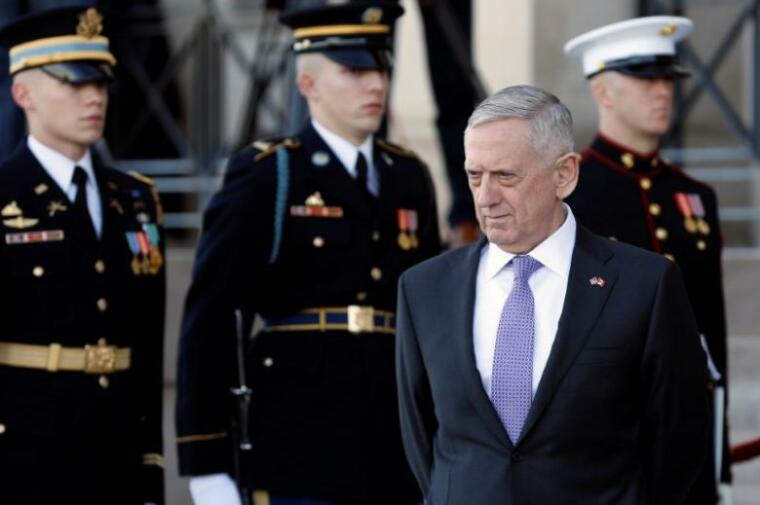Pentagon lays out plan to defeat ISIS within a year

The Pentagon has presented the White House with its preliminary plans to defeat the Islamic State terror group after President Donald Trump asked for a blueprint to annihilate the jihadis about a month ago.
During the presidential campaign, Trump had promised to intensify the fight against ISIS which began under the administration of former President Barack Obama. On Jan. 28, Trump issued an executive order in which he asked for a "preliminary draft" of a plan to defeat ISIS to be submitted to him within 30 days.
On Monday, Defense Secretary Jim Mattis presented the initial draft of the plan to Trump's top national security advisors.
Pentagon spokesman Navy Capt. Jeff Davis said that the details of the report are classified, and it still needs to be further refined. He stated that the report is "a framework for a broader discussion" of a strategy that has to be developed over time, rather than a ready-to-execute military plan.
He further noted that the report defines what it means to defeat ISIS, which he declined to reveal to reporters.
Davis also explained that the report includes some individual actions that will require decisions by the White House, adding that "it's not a 'check-the-block, pick A or B or C' kind of a plan."
"This is a broad plan. It is global. It is not just military. It is not just Iraq/Syria," he said, as reported by The Stream.
Officials familiar with the review said that the report increases emphasis on nonmilitary options, such as efforts to limit the ability of ISIS to recruit and squeezing the group's finances.
Last week, Marine Corps Gen. Joseph Dunford, chairman of the Joint Chiefs of Staff, said that al-Qaeda and other extremist organizations in the Middle East, whose goal is to attack the U.S., will also be targeted in the emerging strategy.
The officials also indicated that the recommended approaches will be patterned after the central elements of the Obama administration's strategy, which focused on the U.S. military supporting local forces rather than fighting for them. Mattis had also suggested that he does not see any advantage in having U.S. combat forces take over the ground war.
"I would just tell you that by, with and through our allies is the way this coalition is going against Daesh," he said in Baghdad last week, using the Arabic acronym for ISIS.
 Christians don't have to affirm transgenderism, but they can’t express that view at work: tribunal
Christians don't have to affirm transgenderism, but they can’t express that view at work: tribunal Archaeology discovery: Medieval Christian prayer beads found on Holy Island
Archaeology discovery: Medieval Christian prayer beads found on Holy Island Presbyterian Church in America votes to leave National Association of Evangelicals
Presbyterian Church in America votes to leave National Association of Evangelicals Over 50 killed in 'vile and satanic' attack at Nigerian church on Pentecost Sunday
Over 50 killed in 'vile and satanic' attack at Nigerian church on Pentecost Sunday Ukrainian Orthodox Church severs ties with Moscow over Patriarch Kirill's support for Putin's war
Ukrainian Orthodox Church severs ties with Moscow over Patriarch Kirill's support for Putin's war Islamic State kills 20 Nigerian Christians as revenge for US airstrike
Islamic State kills 20 Nigerian Christians as revenge for US airstrike Man who served 33 years in prison for murder leads inmates to Christ
Man who served 33 years in prison for murder leads inmates to Christ


 Nigerian student beaten to death, body burned over ‘blasphemous’ WhatsApp message
Nigerian student beaten to death, body burned over ‘blasphemous’ WhatsApp message 'A new low': World reacts after Hong Kong arrests 90-year-old Cardinal Joseph Zen
'A new low': World reacts after Hong Kong arrests 90-year-old Cardinal Joseph Zen Iran sentences Christian man to 10 years in prison for hosting house church worship gathering
Iran sentences Christian man to 10 years in prison for hosting house church worship gathering French Guyana: Pastor shot dead, church set on fire after meeting delegation of Evangelicals
French Guyana: Pastor shot dead, church set on fire after meeting delegation of Evangelicals ‘Talking Jesus’ report finds only 6% of UK adults identify as practicing Christians
‘Talking Jesus’ report finds only 6% of UK adults identify as practicing Christians Mission Eurasia ministry center blown up in Ukraine, hundreds of Bibles destroyed: 'God will provide'
Mission Eurasia ministry center blown up in Ukraine, hundreds of Bibles destroyed: 'God will provide' Church holds service for first time after ISIS desecrated it 8 years ago
Church holds service for first time after ISIS desecrated it 8 years ago Burger King apologizes for 'offensive campaign' using Jesus' words at the Last Supper
Burger King apologizes for 'offensive campaign' using Jesus' words at the Last Supper Uganda: Muslims abduct teacher, burn him inside mosque for praying in Christ’s name
Uganda: Muslims abduct teacher, burn him inside mosque for praying in Christ’s name